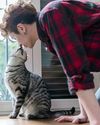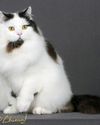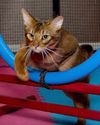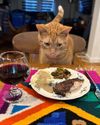Library Cats felis cattus bibliotheca
Cat Talk
|February 2024
Introduction - The Middle Ages, sometimes referred to as “The Dark Ages,” spanned approximately one thousand years, between 479 AD and 1450 AD. This time period is not generally considered to have been friendly to anyone, human nor animal, but it was especially hostile toward felines. Ignorance of knowledge and science was rampant among the majority of the population, with the ability to read limited to clerics and the wealthy. Myths, legends, and galliard songs spread widely throughout Europe as people migrated from place to place, searching for food and a safe habitat. Fear of the unknown and the unexplainable, particularly of witches and their cat familiars, was spread not only by the stories and songs, but by the Popes themselves. Without touching on the atrocities of medieval times, let us just say it was not the best time to be a cat.

However, ancient and medieval Egypt stood apart from the prevailing cat myths and the general purging of the feline population. Cats were still revered and treated as semi-divine beings there. In addition, thanks to a Greek historian, Herodotus, the cat took on another role which allowed scribed history to continue to flourish.

A Strange History
Beginning with their assumed “self-domestication” in ancient Egypt, felines were celebrated and esteemed not only for their beauty but for the importance of their jobs within a home environment—or anywhere else where there was evidence of pesky rodents. Food was not their only target; rats or other rodents also nibbled their own “designs” into what are now priceless scrolls, papyrus tomes, and other historical manuscripts. Herodotus wrote extensively, and frequently mentioned the importance of cats in society in his writings. He “relates how carefully humans tend to their animals’ needs as a reflection of Egyptian religion. To the ancient Egyptians, animals, like everything else around them, were a gift from the gods, and it was their responsibility to value and care for all such gifts,”7 especially cats, whose hunting prowess ensured the safety of both food stores and history.
The Library of Alexandria, one of the Seven Wonders of the Ancient World, was constructed in the third century BC. The ornate buildings housed not only collections of manuscripts, but lecture halls, gardens, and reading centers. It “served as the nation’s epicenter of scholarship, and cats played a central role in its development.”5
Cette histoire est tirée de l'édition February 2024 de Cat Talk.
Abonnez-vous à Magzter GOLD pour accéder à des milliers d'histoires premium sélectionnées et à plus de 9 000 magazines et journaux.
Déjà abonné ? Se connecter
PLUS D'HISTOIRES DE Cat Talk

Cat Talk
Holiday Aromatics
Are They Naughty or Nice?
3 mins
December 2024

Cat Talk
Feline Photographers Part 2
Social media is rife with pictures of our pets, especially cats.
11 mins
December 2024

Cat Talk
Celebrating the Season With Our Cats
As this writer began work on this project to find holiday stories involving cats, she was amazed to find that there are ELEVEN religious holidays celebrated during December!
4 mins
December 2024

Cat Talk
How Cats Find Their Owners
A month after losing her beloved senior cat, a woman named Amin Diane was parked on a street at night, waiting for her friend.
5 mins
December 2024

Cat Talk
Remembering Willa Hawke
Retired CFA Judge Emeritus Willa Hawke passed away August 2, 2024 in Lake Kiowa, TX at the age of 88. She had been a judge for over 50 years before her retirement in 2016.
1 mins
December 2024

Cat Talk
UP CLOSE AND Purr-sonal
Thoughtful... Caring ... Giving ...Helpful... Committed.
4 mins
December 2024

Cat Talk
DON'T PUFF AROUND PUFF!
THE EFFECT OF SECONDHAND SMOKE ON CATS
5 mins
December 2024

Cat Talk
Fluffy Coats
AND HOW TO CARE FOR THEM
7 mins
December 2024

Cat Talk
Feline Agility?
I Thought Agility Was For Dogs!
7 mins
December 2024

Cat Talk
Come Fly With Me!
TIPS ON NAVIGATING AIRPORT SECURITY WITH YOUR CAT
4 mins
December 2024
Listen
Translate
Change font size

